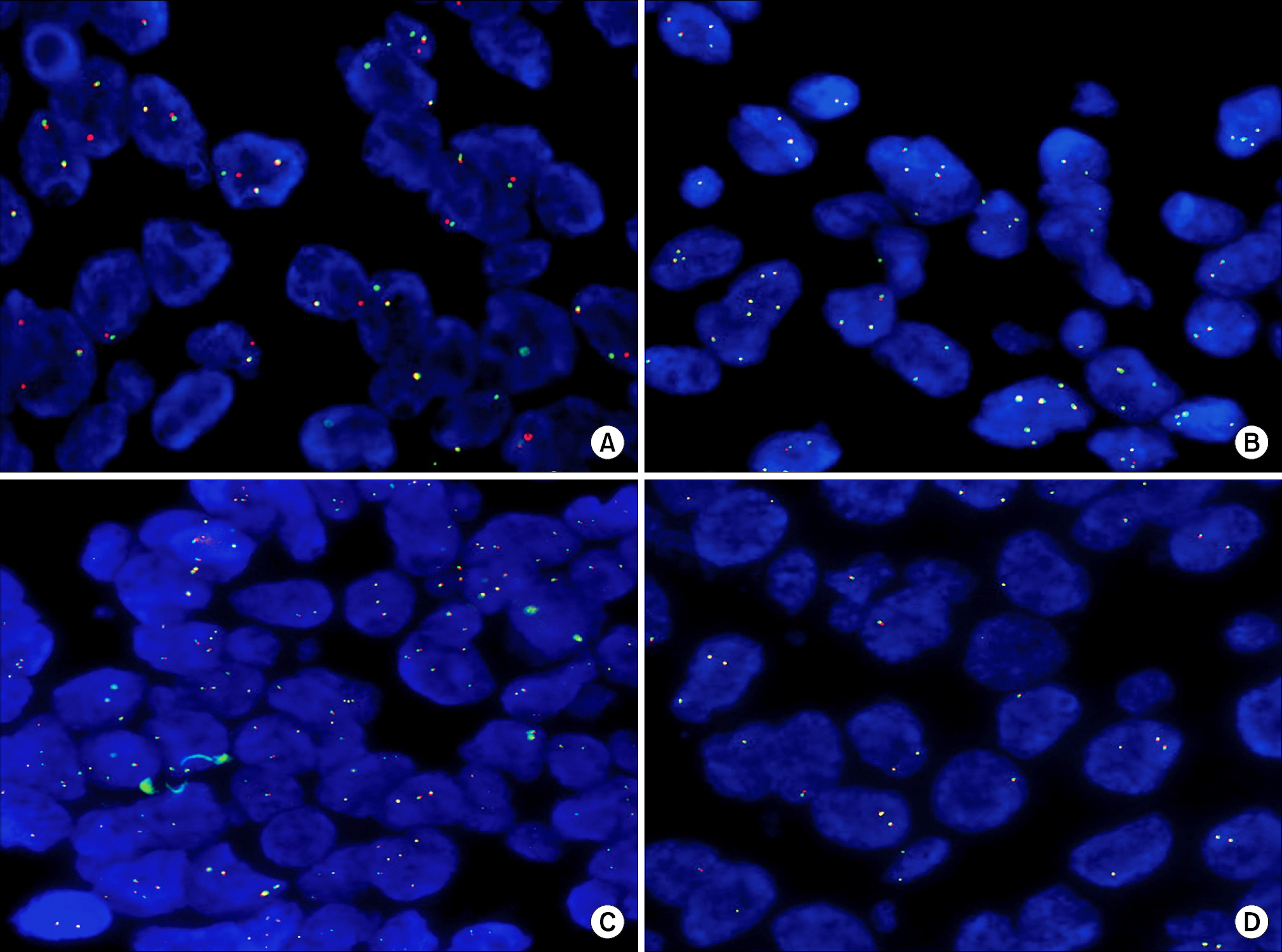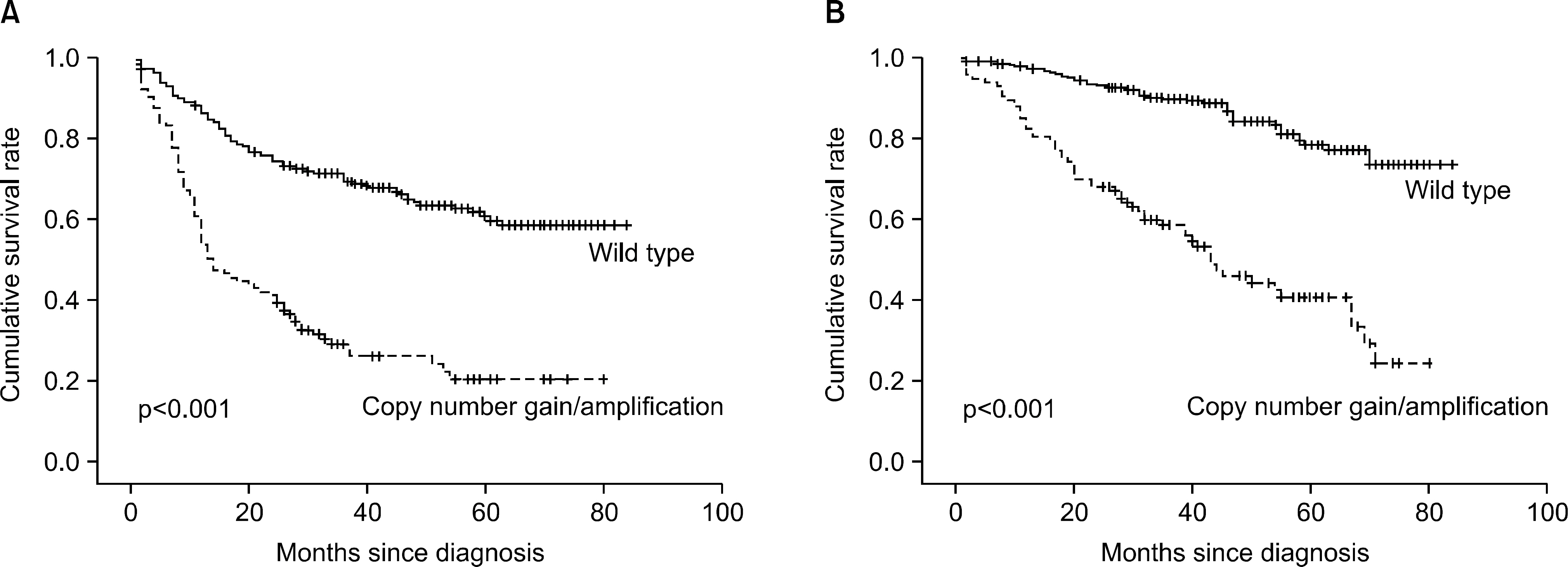J Lung Cancer.
2011 Dec;10(2):87-93. 10.6058/jlc.2011.10.2.87.
Clinicopathologic Implications of ALK Gene Copy Number Gain in Non-small Cell Lung Cancer
- Affiliations
-
- 1Department of Pathology, Seoul National University College of Medicine, Seoul, Korea. chungjh@snu.ac.kr
- 2Department of Pathology, Seoul National University Bundang Hospital, Seongnam, Korea.
- 3Department of Thoracic and Cardiovascular Surgery, Seoul National University Bundang Hospital, Seongnam, Korea.
- 4Department of Internal Medicine, Seoul National University Bundang Hospital, Seongnam, Korea.
- KMID: 2005739
- DOI: http://doi.org/10.6058/jlc.2011.10.2.87
Abstract
- PURPOSE
The anaplastic lymphoma kinase (ALK) gene is a potential molecular target in non-small cell lung carcinoma (NSCLC). The clinicopathologic implication of a change in the ALK gene copy number (GCN) is unclear.
MATERIALS AND METHODS
A total of 434 primary NSCLC samples were analyzed by fluorescence in situ hybridization (FISH) for ALK GCN.
RESULTS
Ninety-six cases (22.1%) showed ALK GCN gain with amplification in 16 (3.7%) cases. The cases with ALK GCN gain consisted of 47 adenocarcinomas (49.0%), 41 squamous cell carcinomas (42.7%), 5 adenosquamous carcinomas (5.2%) and 3 other NSCLCs (3.1%). ALK gene amplification was identified in 7 adenocarcinomas (43.7%) and 9 squamous cell carcinomas (56.3%). There was no significant difference between ALK GCN gain/amplification and histologic subtypes. Univariate survival analysis revealed that patients with ALK GCN gain/amplification showed shorter progression-free survival durations and decreased overall survival rates (p<0.001). However, multivariate analysis proved that ALK GCN gain/amplification is not an independent prognostic factor for progression-free survival or overall survival.
CONCLUSION
ALK GCN gain is frequently identified in NSCLCs and the incidence is similar among histologic subtypes. Although ALK GCN gain/amplification is not an independent prognostic marker, it is associated with tumor progression in NSCLC.
MeSH Terms
-
Adenocarcinoma
Carcinoma, Adenosquamous
Carcinoma, Non-Small-Cell Lung
Carcinoma, Squamous Cell
Disease-Free Survival
Fluorescence
Gene Amplification
Gene Dosage
Humans
In Situ Hybridization
Incidence
Lung
Lymphoma
Multivariate Analysis
Phosphotransferases
Receptor Protein-Tyrosine Kinases
Survival Rate
Phosphotransferases
Receptor Protein-Tyrosine Kinases
Figure
Reference
-
1. Jemal A, Siegel R, Xu J, Ward E. Cancer statistics, 2010. CA Cancer J Clin. 2010; 60:277–300.
Article2. Schiller JH, Harrington D, Belani CP, et al. Comparison of four chemotherapy regimens for advanced non-small-cell lung cancer. N Engl J Med. 2002; 346:92–98.
Article3. Scagliotti GV, De Marinis F, Rinaldi M, et al. Phase III randomized trial comparing three platinum-based doublets in advanced non-small-cell lung cancer. J Clin Oncol. 2002; 20:4285–4291.
Article4. Soda M, Choi YL, Enomoto M, et al. Identification of the transforming EML4-ALK fusion gene in non-small-cell lung cancer. Nature. 2007; 448:561–566.
Article5. Kwak EL, Bang YJ, Camidge DR, et al. Anaplastic lymphoma kinase inhibition in non-small-cell lung cancer. N Engl J Med. 2010; 363:1693–1703.
Article6. Ou SH, Bazhenova L, Camidge DR, et al. Rapid and dramatic radiographic and clinical response to an ALK inhibitor (crizotinib, PF02341066) in an ALK translocation-positive patient with non-small cell lung cancer. J Thorac Oncol. 2010; 5:2044–2046.
Article7. Cools J, Wlodarska I, Somers R, et al. Identification of novel fusion partners of ALK, the anaplastic lymphoma kinase, in anaplastic large-cell lymphoma and inflammatory myofibro-blastic tumor. Genes Chromosomes Cancer. 2002; 34:354–362.
Article8. Chen Y, Takita J, Choi YL, et al. Oncogenic mutations of ALK kinase in neuroblastoma. Nature. 2008; 455:971–974.
Article9. Wong DW, Leung EL, So KK, et al. The EML4-ALK fusion gene is involved in various histologic types of lung cancers from nonsmokers with wild-type EGFR and KRAS. Cancer. 2009; 115:1723–1733.10. Shaw AT, Yeap BY, Mino-Kenudson M, et al. Clinical fea-tures and outcome of patients with non-small-cell lung cancer who harbor EML4-ALK. J Clin Oncol. 2009; 27:4247–4253.
Article11. Camidge DR, Kono SA, Flacco A, et al. Optimizing the detection of lung cancer patients harboring anaplastic lymphoma kinase (ALK) gene rearrangements potentially suitable for ALK inhibitor treatment. Clin Cancer Res. 2010; 16:5581–5590.
Article12. Paik JH, Choe G, Kim H, et al. Screening of anaplastic lymphoma kinase rearrangement by immunohistochemistry in non-small cell lung cancer: correlation with fluorescence in situ hybridization. J Thorac Oncol. 2011; 6:466–472.
Article13. Kim H, Yoo SB, Choe JY, et al. Detection of ALK gene rearrangement in non-small cell lung cancer: a comparison of fluorescence in situ hybridization and chromogenic in situ hybridization with correlation of ALK protein expression. J Thorac Oncol. 2011; 6:1359–1366.
Article14. Salido M, Pijuan L, Martí nez-Avilé s L, et al. Increased ALK gene copy number and amplification are frequent in non-small cell lung cancer. J Thorac Oncol. 2011; 6:21–27.
Article
- Full Text Links
- Actions
-
Cited
- CITED
-
- Close
- Share
- Similar articles
-
- Bilateral Ovarian Metastases from ALK Rearranged Non-Small Cell Lung Cancer
- Copy Number Alterations of BCAS1 in Squamous Cell Carcinomas
- Targeted Therapy for Non-Small Cell Lung Cancer
- EML4-ALK Fusion Gene in Korean Non-Small Cell Lung Cancer
- Histologic Features of ALK-Expressing Adenocarciomas of the Lung



